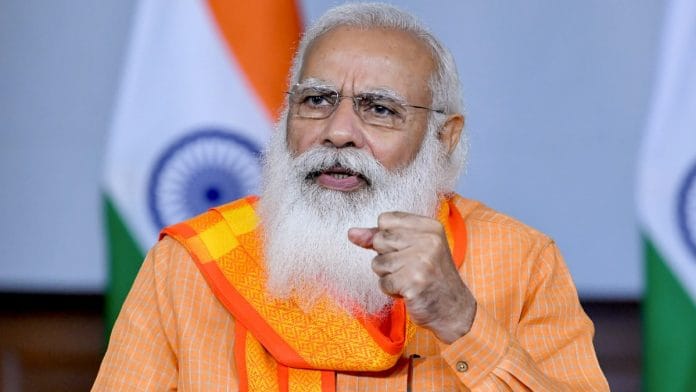New Delhi: The BJP-led government’s handling of the devastating second Covid-19 wave has resulted in Prime Minister Narendra Modi’s lowest ever approval ratings, even though he continues to fare better than other global heads, according to a survey conducted by an American data intelligence firm.
Data collected by Morning Consult through its Political Intelligence unit, a “proprietary platform that provides real-time polling data on political elections”, has found that the drop in Modi’s approval ratings has coincided with his government’s handling of the pandemic.
The data states that on 8 May this year, when India recorded its peak in the second wave with 3,91,263 cases on the day, Modi’s approval ratings stood at 63 per cent, the lowest since August 2019, from when Political Intelligence has been maintaining its popularity graph.
The prime minister’s disapproval ratings on the day shot up to 32 per cent — the highest since August 2019.
Morning Consult plots its graphs “based on a seven-day moving average of all adults in a given country with a margin of error of between +/- 1-3%”. Online interviews are conducted of a “nationally representative sample of adults”. Approximately, 2,126 adults were sampled for the data on India.
“In India, the sample is representative of the literate population,” its website notes. “Surveys are weighted in each country by age, gender, region, and, in certain countries, education breakdowns based on official government sources.”
According to the survey, Modi’s popularity didn’t even really dip during the first wave of the pandemic, and had, in fact, peaked at an approval rating of 84 per cent in May 2020.
It dropped to 75 per cent around mid-June and stayed around that mark until April this year. Even when the first wave peaked on 17 September, on a day the country recorded 93,735 cases, the prime minister’s approval and disapproval ratings were at 74 per cent and 21 per cent respectively, the data shows.
Political Intelligence also states that in August 2019, when the Modi government abrogated Article 370 for Jammu and Kashmir, his approval ratings stood at 82 per cent, while disapproval ratings were at just 11 per cent.
All of this, however, has significantly dissipated in the last month. According to the graph, as of 27 May, Modi’s approval ratings stand at 64 per cent and disapproval ratings are at 27 per cent.
The Morning Consult findings come on the back of a C-Voter survey, which had also found that the prime minister’s popularity had dropped substantially.
“Modi govt’s approval rating shattered all records in the C-Voter’s Mood of the Nation survey over the past seven years. In seven weeks, that popularity has completely collapsed,” Yashwant Deshmukh, the founder-director, C-Voter International, had argued in ThePrint.
Also read: Lesson to Modi from ‘Accidental Prime Minister’ — PM ki kursi zameen se door kar deti hai
Still the best performing global head
Despite India being the worst performing country during the second coronavirus wave and a vaccination drive that has met with one hurdle after another and has been severely criticised, Modi’s net approval graph (+33) stands well above that of other global leaders such as French President Emanuel Macron (-21), Brazil’s Jair Bolsonaro (-16), UK Prime Minister Boris Johnson (6) and Canada’s Justin Trudeau (0).
A negative net approval means that more people are dissatisfied with the leader’s work than those who are satisfied. A net approval rating is calculated by subtracting the day’s disapproval rating from the approval rating.
German Chancellor Angela Merkel and Australian Prime Minister Scott Morrison reflected the highest jump in approval ratings. Both their approval ratings have shot up significantly since March last year, when the pandemic began taking a toll across the world.
For Merkel, her approval ratings stood at 40 per cent in the first week of March 2020, which quickly increased to around 58 per cent by April end last year and has remained in the 50-60 per cent bracket.
Similarly, Morrison’s approval ratings doubled from 32 per cent in March last year to 64 per cent by April end. It has since come down to 54 per cent.
Merkel has been repeatedly lauded for how well she has handled the first wave of the pandemic.
“As other leaders on both sides of the Atlantic fumbled a year ago in their responses to the coronavirus, the German chancellor epitomised leadership and steady nerves,” Judy Dempsey, non-resident senior fellow at Carnegie Europe had argued.
However, after three Covid-19 waves in the country — with the current one yet to subside — and a slow vaccination drive, her administration has earned grave criticism from many.
Australia, meanwhile, currently has just 121 active cases. With both its first and second Covid-19 wave subsiding quickly, the country’s pandemic graph has remained close to the X-axis since November last year.
US President Joe Biden, who took over only as recently as January this year, has had steady approval (54 per cent) and disapproval (38 per cent) ratings, while Japanese Prime Minister Yoshihide Suga (63 per cent), Spain’s Pedro Sanchez (59 per cent) and South Korean President Moon Jae-In (58 per cent) have seen disapproval ratings shoot well beyond approval ratings in the past year.
(Edited by Arun Prashanth)
Also read: In Modi-Mamata tussle, it’s the IAS that is losing out. Supreme Court must step in






